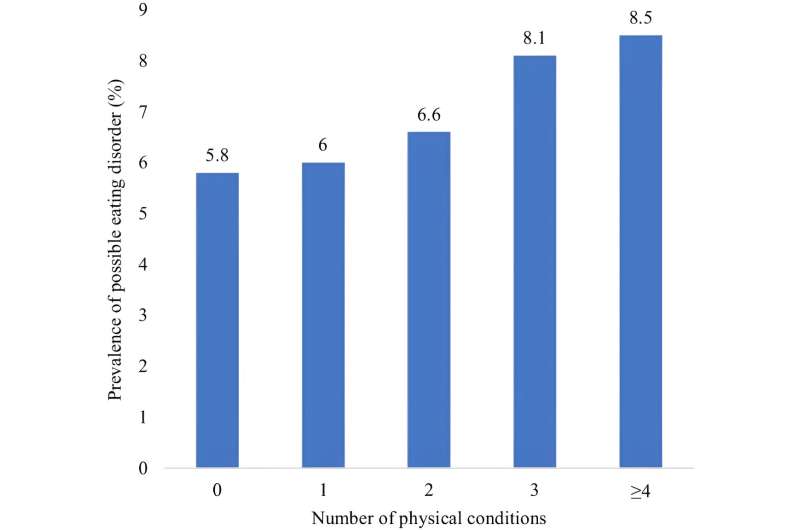This article has been reviewed according to Science X's editorial process and policies. Editors have highlighted the following attributes while ensuring the content's credibility:
fact-checked
trusted source
proofread
Study reveals health impact of eating disorders

A new UK study has revealed a significant association between eating disorders and physical multimorbidity, shedding new light on the health risks faced by people with these conditions.
The research, led by Anglia Ruskin University (ARU) in collaboration with the University of Cambridge's Biomedical Research Centre, explores the complex relationship between eating disorders, physical health, and other issues that can influence it.
Researchers analyzed data from 7,403 UK adults. Respondents were asked about 20 physical conditions including cancer, diabetes, eye issues, migraines, digestive problems and heart issues. Influential factors, or mediators, considered included alcohol dependence, insomnia, smoking, perceived stress, obesity and being underweight.
The study found that people with possible eating disorders made up 6.4% of respondents, and individuals within this cohort were 2.11 times more likely to report physical multimorbidity, defined as having two or more physical health conditions concurrently.
An eating disorder is defined as a pathological relationship with food that leads to significant disruptions in a person's day-to-day life. It is estimated that as many as 3.4 million people in the UK have an eating disorder.
Anxiety emerged as the leading influential factor in the eating disorder and physical multimorbidity relationship. Insomnia, perceived stress, and depression were also identified to be important.
Previous research has shown that multimorbidity is associated with a significant burden on health care services including care transition costs and primary care, dental care, and hospitalizations. Multimorbidity affects around 42.4% of the world's population.
Lead author Lee Smith, Professor of Public Health at Anglia Ruskin University (ARU), said, "We believe this is the first study to investigate the association between eating disorder symptoms, or possible eating disorder, and physical multimorbidity, and also the first to quantify how this association may be explained by a variety of influencing factors."
"This research underscores the complex interplay between mental and physical health. It is essential to recognize that eating disorders can have far-reaching consequences, affecting not only emotional well-being but also physical health. Understanding the role of potential mediators in this relationship is crucial for developing effective interventions."
The findings hold significant implications for public health, highlighting the need for further investigation into the causality and underlying mechanisms of the link between eating disorders and physical multimorbidity. In the long term, this research could guide the development of strategies to reduce multimorbidity in people with eating disorders by addressing influencing factors."
The work is published in the journal Eating and Weight Disorders—Studies on Anorexia, Bulimia and Obesity.
More information: Lee Smith et al, Eating disorders and physical multimorbidity in the English general population, Eating and Weight Disorders—Studies on Anorexia, Bulimia and Obesity (2023). DOI: 10.1007/s40519-023-01600-0


















